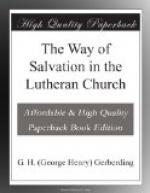While the church at Ephesus lost its first love, and that at Pergamos permitted false doctrine to creep into it and be a stumbling block, and that at Thyatira suffered Jezebel to seduce Christ’s servants, and that at Sardis did not have her works found perfect before God, and that of Laodicea had become lukewarm; yet the church at Smyrna, with all her tribulation and poverty and persecution, remained rich and faithful in the sight of God, and that at Philadelphia had kept the Word of God’s patience, and her enemies were to know that God loved her. While the former five were censured, the latter two were approved. The former might have remained as faithful as the latter. It was their own fault and sin that the former needed a revival. The latter needed none. Which were the better off?
We believe that where there is a sound, faithful and earnest pastor, and a docile, sincere, earnest, united and active people, many will grow up in their baptismal covenant; and among those who wander more or less therefrom, there will be frequent conversions, under the faithful use of the ordinary services and ordinances of the Church. Such, we believe, were the pastorates of Richard Baxter, at Kidderminster; of Ludwig Harms, at Hermansburg; of Oberlin, at Steinthal; and of our late lamented Dr. Greenwald, at Easton and Lancaster. None of these churches, after their pastors were fairly established in them, needed revivals. And such, doubtless, have been thousands of quiet, faithful pastorates, some known to the world, and others known only to God. Blessed are those churches in which the work of Grace is constantly and effectively going on, according to God’s Way of Salvation.
CHAPTER XXIV.
MODERN REVIVALS.
We have shown that it ought to be the great aim and object of the Church to preclude the necessity of occasional religious excitements. We also showed, by example from Scripture and from Church history, that it is possible to attain this end. If parents did but understand and do their duty in the family, teachers in the Sunday-school and pastors in the catechetical class and pulpit, children would very generally grow up in their baptismal covenant; and a church made up of such members would not depend for its growth and life on periodic religious revivals.
But—alas, that but!—parents, teachers and pastors too often come short of their duty. Carelessness, worldliness and godlessness hold sway in too many of the congregations, homes and families. There is a spirit of love of pleasure, greed for gain and haste to be rich, that has taken hold of the heart and life of too many professedly Christian parents. There is no time for God’s Word or earnest prayer with and for the children. There is often little if any religious instruction or Christian example. The little ones breathe in a withering, poisonous, materialistic atmosphere. The germs of the divine life, implanted in baptism, either lie dormant, or are blighted after their first manifestations. They grow up with the idea that the great object of life is to gain the most, and make the best of this world.




